New Wave /
Punk / Etc.
aka What the
Late 70s and Early 80s have wrought
The Buzzcocks, The Cars,
The Clash, The Jam, The
Modern Lovers, Pere Ubu, The
Sex Pistols,
Television, Wire.
The reviews on this page are in a greater state of flux
than others. All of these artists merit their own pages, but
because I am doing a sampler round first, some of the scores may be
adjusted. It is my intent to alternate US and UK bands in doing
this, and yes I realize I haven't reviewed the Ramones (or the Damned
for that matter). That is only because I haven't gotten my
hands on a copy of their debut - I own Rocket to Russia, Road
to Ruin and a couple other albums. Also, I am not really blindly
giving out 4 star ratings.
 The
Modern Lovers (rec. 1972-3, rel. 1976), ****1/2
The
Modern Lovers (rec. 1972-3, rel. 1976), ****1/2
Garage
rock for the early 70s, with an avid Lou Reed follower at the helm.
Singer/guitarist Jonathan Richman positively evinces the angst-ridden
teenager (and looks about 15 in the photos) while using a delivery
blatantly borrowed from Reed, all in a delightful Boston accent that
is a combination of George Plimpton and a head cold. Richman
certainly isn't writing songs like Reed, instead it's a lot of
first-person loves, likes, dislikes, etc. sounding remarkably similar
to the garage rock of the 60s ("Astral Plane" is about as
close as you can get). Richman occasionally drops in some real
lyrical curios ("Girlfriend" which is spelled out "G-I-R-L
F-R-E-N" in the chorus, or "Hospital" which he tells
us that he "goes to bakeries all day long") amongst his
longings, and there is a good number of fun, more rocking tunes
("Modern World", "Roadrunner", "Dignified
and Old") that show how talented a songwriter Richman was.
Possibly because these were only demos it is very clean sounding,
with a general aversion to solos (although a couple of VU-like messes
show up like on "Pablo Picasso" or "Someone I Care
About") which make them sound like professional garage rockers
(an oxymoron if there ever was one). Outside of the production,
the band is suitably crisp in their playing as well. Future
Talking Heads member Jerry Harrison plays a lot of puny organ lines
that sound like they were directly lifted from Pearls
Before Swine, and when combined with a rhythm section (including
future Cars drummer David Robinson) that sounds only a couple steps
removed from fellow Bostonians Aerosmith,
the album does a good job combining the past with their present.
The bulk of this album was produced by John
Cale, but the funniest two tracks are done by Kim Fowley - ("I'm
Straight" whose lyrics are phone message applying to be
someone's boyfriend because he's "not stoned / like hippy
Johnny," and "Government Center").
It's also
funny to see future New Wave bigshots with long 70s hair.
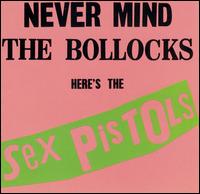 Never
Mind the Bollocks, Here's the Sex Pistols (Nov. 1977), ***
Never
Mind the Bollocks, Here's the Sex Pistols (Nov. 1977), ***
Along
with the Ramones and the Clash, the Sex Pistols are widely considered
the pioneers of punk. The Ramones predate the others, but I
have some qualms about anointing them the original punks.
Admittedly, I haven't heard their first two albums, but although they
nail down the stripped-down sound of the punk movement they lack any
substantial emotion. They play loud, fast and short, but what
they say isn't anything special at all - it's usually just dumb.
The Clash were more political, more traditional, and more diverse
musically. The Sex Pistols took the underground pub-rock sound,
made it more hard rock, but all built around in-your-face
irrationality. Like a televised riot where societal values are
inverted, Never Mind the Bollocks is abhorrent, absorbing and
ultimately fascinating as long as you aren't the one doing a Reginald
Denny impression.
It is really
fascinating to consider a band focused more an abstract idea (chaos,
anarchy) rather than sound. Self-destruction is paramount to
the Sex Pistols' message, and if this music could eat away at itself
and dissolve into dirt, it would be fitting. This, they say, is
punk music, but what does that mean? Sound-wise, it is the
principles the Ramones established - guitar, bass, drums, vocals and
little else. It's hard rock without the glamour --what little
guitar solos exist are buried along with the rest of the guitar sound
in the back of the mix, allowing Rotten's half-crazed snarl to grab
the lion's share of the attention. Rotten sounds like he's one
of the gang from A Clockwork Orange loosed in a vengeful
knife-fight - a fascinating idiosyncratic attack (the evil cackle in
"Anarchy in the UK", or the harshness of "EMI").
What sets the Sex Pistols apart is their attitude, and by extension,
their lyrics. From the boot-stomping introduction it is clear
these guys are angry, and have no time or respect for the rest of
us. Great art is often the product of the put-upon and the Sex
Pistols give them a voice here, essentially demanding to be heard.
Take the song "Bodies" - sure it's a graphic song about
abortion, but at the same time it's about silencing.
Anarchistic and Self-Destructive? Sure ("Anarchy in the
UK" pretty much says it all). Bitter? Hell, these
guys make Ray Davies look like a guy coughing comments down his
sleeve. But where Davies mocked the peacocks and rich-kids, the
Sex Pistols dislike everyone else and pride themselves in ignorance
and depravity ("Pretty Vacant", "No Feelings",
the chorus of "Seventeen" which goes "I'm a lazy
sod"). Combined with the music it's not simply a gut-punch
to society, it's a big whollop to the forehead with brass knuckles
which leave an imprint saying "I'M ****ED" ("Problems").
But for all their anger and anarchist mouthing the Sex Pistols are a
remarkably competent band. No flash is the formula, although
they stick a Raw Power-esque intro onto "Bodies",
and they don't need flash. When they keep things fast and
uncompromising, that's good. The danger is always that with
such a basic sound the songs can sound the same, which is a trap they
do a good job of avoiding. There are a couple of blah tracks
("Seventeen" and "New York") and one that
admittedly mystifies me - "Submission" (a good song, but
it's hard to tell if it's just plain hard rock, or a mockery of it,
with lines like "I can't figure out your watery love").
That being said, it works either way. In conclusion, it
would be hard to understate the enormous historical importance of
this album. Producer Chris Thomas (yes, this
Chris Thomas) understands what's going on, and does a damn fine
job.
 The
Clash [US Version] (1977 [1979]), ****1/2
The
Clash [US Version] (1977 [1979]), ****1/2
From
this album's opening chords you knew it was going to be different.
This wasn't art rock. This wasn't metal. This wasn't
misogynistic hard rock. This wasn't even the Sex Pistols.
This was rock rock - fast, basic and infectious. Two guitars
and a rhythm section. No pomp, no circumstance. For their
political and age dividing message the Clash draw on loud power
chords and infused it with reggae ("(White Man) In Hammersmith
Palais" and "Police & Thieves"). The album's
opening with "Clash City Rockers" explains it in a
nutshell. Intentional or not, the first three chords are the
same as the Who's "I Can't Explain", thereby drawing on
that mid-60s image of crackerjack R&B to call forth all the old
generational divide frustrations previously expressed. But the
chord sequence goes on, for this is no mere homage or revival - the
Clash took that traditional sound further. Clean, simple
production - none of the mess of the Sex Pistols, but no Rotten on
vocals either. Joe Strummer and Mick Jones are both fine
guitarists (try the alternating guitar lines on "Complete
Control"), and Strummer (who has a distinct voice - slightly
gruff) sings most leads with Jones doing clear traditional backing
vocals. But despite having legions of progeny that
consist of 14 year olds with spiked hair complaining about love gone
bad over abysmal playing, the original punks stick to social issues
("Hate & War", "Remote Control" among
others). This is a triumph of songwriting, with one great song
after another (no, I'm not going to list them parenthetically), and
only a few lesser moments ("Garageland"). A couple of
killer covers later ("I Fought The Law" and the reggae
masterpiece "Police & Thieves" with perfectly synched
falsetto oh yeahs from Jones) and you couldn't ask for more.
Short, punchy songs that never lose their social conscience or their
focus. The US version replaces a few original tracks with UK
singles, but I haven't heard the UK version. Produced by the
group and Micky Foote (for the most part).
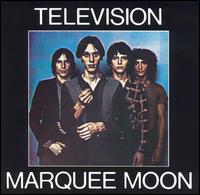 Television,
Marquee Moon (Feb. 1977), *****
Television,
Marquee Moon (Feb. 1977), *****
Clean.
Very clean. Precise. Quite precise. Two guitars
with little tones added, a drum set, a bass and a small amount of
piano. The guitars are not opposites, not opposing, but a sort
of joint tenancy of sound. Partners, if you will. Accordingly,
Andy Johns' production is incredibly crisp. You hear each note,
each tap of the symbol, each vocal inflection. This is an album
of notes, not of chords. This is hip music. A certain
presence permeates Marquee Moon, drawing on both Lou Reed and
Bryan Ferry (and even some Van Morrison). These are not broad
strokes, or a populist billboard like early punk; this is pointillism
on a canvas framed. But it is strong, vibrant, and definitely
rock. These are men drawing on a wide variety of sources in
rock, but being suckered in by none of them. While the sound is
simple and straightforward like
most New Wave acts, there are subtleties. No
fractals here, but well sequenced details ready to emerge for the
discriminating ear. Guitarist/vocalist/songsmith Tom Verlaine
might have been his generation's equivalent of a "guitar hero,"
except that badge solely denotes a combination of technical skill and
self-importance. Verlaine is subject to the sound, not
only in conjunction with co-guitarist Richard Lloyd, but to the
attitude of the music evinced by everyone. Lloyd has an
important role, scoring some nice leads here and there, and holding
down the fort during Verlaine's adventures down the neck of his
guitar. With one guitar (and bassist Fred Smith, of course) usually
in rhythm mode, drummer Billy Ficca may just be the counterpart to
Stewart Copeland, effortlessly changing the beat around, and varying
his fills. Even the rhythm section is not simply rhythm.
The sound is less layered then other bands, making the bass and
second guitar more partners than Yertl the Turtle style
subjects. From the sweeping epics of rock (title track,
"Torn Curtain") to more pop songs like ("Guiding
Light", "Prove It") it is clear this is an album not
only for guitar lovers, but for music lovers. While some tracks
may be easier to grasp on first listen ("I See No Evil",
"Venus"), like stirred sediment in a jar - after a
time all becomes clear.
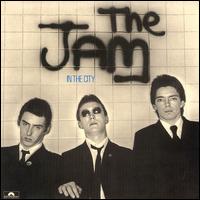 The
Jam, In the City (May 1977), **1/2
The
Jam, In the City (May 1977), **1/2
Dear Pete
Townshend,
Hey, I really liked
the work you guys did on your debut in 1965. I've tried to
capture the same sound of R&B, Motown and distorted guitar on my
own album, but sped up a bit. Please find a copy enclosed for
your enjoyment.
Yours Truly,
Paul Weller
It used to be that
musicians directly covered their influences, penning little love
letters or tributes to their idols. Paul Weller was no
different, and Weller was the man behind the Jam as their
guitarist/singer and songwriter. Who does Weller like?
The Who, and in particular the very early Who. This is no vague
Valentine's Day card scrawl - Weller has big non-sexual man-crush on
Pete Townshend. Yes, this could be titled The Jam Play The
Who Sing My Generation, as In the City is a pile of R&B
rock songs a la Who, but sped up to keep apace with the times ("Slow
Down", "Sounds From the Street"). Weller may
have actually stopped listening to music after A Quick One
(The "Batman Theme"?!? -- straight from the 1966 Ready
Steady Who EP). Power chords, feedback, a lack of soloing -
the Who down to a T as in Townshend (the roaring "I've Changed
My Address"). It would be much better if Weller didn't
fall into the trap of having the songs sound alike ("Bricks and
Mortar" is the only markedly different track). A distinct
album, but merely torch-bearing. Their later work is far better
than this. Produced by Vic Smith and Chris Parry.
 The
Cars (Jun. 1978), ****
The
Cars (Jun. 1978), ****
The
Cars inhabited the more rock and commercial end of the "new
wave" spectrum. While English punk rock was turning to 60s
R&B as an influence, New Wave bands like the Cars and Blondie
turned to analogous influences. So The Cars has a
mechanical beat, low-grade synths, and dramatic vocals, welded with
garage rock ("Let The Good Times Roll", "You're All
I've Got Tonight"), 60s honky-tonk ("My Best Friend's
Girl"), or power-pop ("Just What I Needed").
This music is not simple or reduced (like the Talking Heads' debut)
as much as it melds several New Wave techniques with traditional
rock. Guitarist/singer Ric Ocasek's lyrics stick to the tried
and true - having fun and love. In some ways they really are a
successor to the Modern Lovers, combining the old world with new
world, except with a distinctly commercial sheen. Most of the
credit goes to producer Roy Thomas Baker, ironically an arena-rock
vet, whose touch is immediately recognizable thanks to the distinctly
Queen-like overdubs during some choruses. He also puts some
treatments on the lead vocals of Ocasek and bassist Benjamin Orr.
Outside of the four big tracks, however, there is a drop-off in
quality. Two of the tracks are plain oddities - "I'm In
Touch With Your World" centers around an odd little rhythmic
phrase played out by ex-Modern Lovers drummer David Robinson and is
dated hokum, and "Moving In Stereo", co-written by
keyboardist Greg Hawkes, is an oddly dark song with dancing synth
lines. The problem with both is that there isn't any movement
in the music, and the atmosphere isn't compelling enough on its own.
The remaining pair are decent enough (the galloping "Don't Cha
Stop" with Sparks-like synth and the moody "All Mixed Up"
whose central riff sounds like an updated version of a classical
piece) but aren't on the big songs. Despite the capabilities of
both Ocasek and lead guitarist Elliot Easton (and there are actual
guitar solos on here), it is Hawkes who occupies the most interesting
position in the sound. He may stick to simple little rhythms,
but he does come up with some catchy lines (the best being the scooty
solo in "Just What I Needed") and varies the tone well.
However, the synths also make the music sound dated at times (the
excessively computer-like tone in "I'm In Tough With Your World"
or in "Bye Bye Love" where it sounds very cheesy). A
maximizing of talent from a weaker band, and therefore a weaker four
stars.
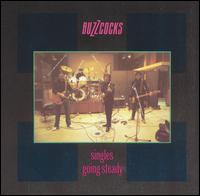 The
Buzzcocks: Singles Going Steady (rec. 1977-9, rel. 1979),
****1/2
The
Buzzcocks: Singles Going Steady (rec. 1977-9, rel. 1979),
****1/2
Sometimes
music is just too simple. Singles Going Steady has the
double curse of being inherently likeable and simple. Why is
this a curse? Because stupid reviewers like your humble author
keep thinking they might have been missing something, and it's very
painless to go back and listen the album again. That's why for
the better part of what - two months now? - I've been listening to
Singles Going Steady on and off. While as a general rule
I don't review compilations, this is a single collection, which is
different. Specifically, this is the bands first eight singles,
all the A-sides followed by the B-sides. The Buzzcocks, led by
Pete Shelley, wedded the nascent punk sound to 60 Brit-rock, and
cranked out a pile of short, snappy songs dealing with love and the
like. To my admittedly non-British ears, Shelley sings like the
rebellious son of Ray Davies, and the rest of the band (Steve Diggle
on guitar, Steve Garvey on bass, and drummer John Maher) are as good
as they need to be. The album opens up with "Orgasm
Addict" which is exactly what the title implies - fast, smutty,
and hilarious. The first singles are all in this hook-laden
vein (although not so explicit), and all damn excellent ("What
Do I Get?", "I Don't Mind", "Love You More",
"Ever Fallen in Love?", "Promises").
As time wears on, they grow faintly darker and reaching
out beyond the massive rhythm guitars of their earlier works
("Promises"), until their final A-side finds some angry
yelled lyrics sung like Mick Jones ("Harmony In My Head").
The band consistently cranked out excellent songs, up to the last two
singles ("Everybody's Happy Nowadays" and "Harmony in
My Head"). B-Sides are almost by definition an odd lot.
"What Ever Happened To?", the B-side to "Orgasm
Addict" is sort of the punk equivalent to "The Village
Green Preservation Society" - with Shelley repeated asking "What
ever happened to"? This is the band's more frenzied punk
side ("Oh Shit" has classic lines like "Admit admit
you're shit you're shit", "Autonomy" is built around a
killer riff). But there's some fluff as well ("Noise Annoys"
has a throw-away guitar solo at the beginning. Some of them
could have easily passed for A-Sides ("Just Lust",
"Lipstick"), except they are a shade darker. But for
the most part, these tracks are also more complicated than the
A-sides ("Noise Annoys" is pretty much filler, but still
intricate enough to grab my attention). Again, there was some
fundamental shift for the last two singles. "Why Can't I
Touch It?", the flip side to "Everybody's Happy Nowadays"
is built around a infectious bass riff, and grooves (grooves!)
on for about six and a half minutes. Unexpected, but welcome.
The final track, "Something's Gone Wrong Again" is just a
litany of shitty things happening, and is set to some dark and creepy
music, and has a strangled guitar solo. Maybe they should have
made the album the first seven singles. Popular legend has it
that the group was primarily a singles group, although they did
release a fair number of albums in the UK, while Singles Going
Steady was their first album released in the US. The band
broke up a few years later (actually over a dispute regarding this
album), but reunited in the late 1980s, and still going today.
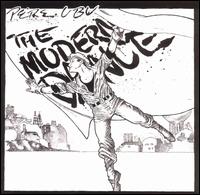 Pere
Ubu: The Modern Dance (Jan. 1978), ****
Pere
Ubu: The Modern Dance (Jan. 1978), ****
Naming
yourself after a highly influential surrealist play is a big move,
and Pere Ubu justify it nicely. Alfred Jarry's play
incorporated nonsense, the impossible, and bickering in a highly
experimental format, making a sharp contrast with the realism that
dominated most stages at the time. While the play may have
introduced large pieces of irrationality into the theatre, Pere Ubu
incorporated man's irrational side into their music. Their
sound is full of those erratic impulses that are contained within
everyone. Shrewdly, the band keeps them contained as well,
although it is a struggle that encompasses the entire album.
From the synths stuck on feedback that open the album on
"Non-Alignment Pact" to the jerky rhythms that show up,
oftentimes this music is the equivalent of perception through a
spinning head. Part avant-garde, part New Wave, part
performance art, it is what you would expect from a group with a
leader who penned art manifestos and was fueled by a desire to push
music forward. Every track is almost a musical representation
of one person's mind - with Thomas acting as the inner voice, and the
emotional and other urges given life by the rest of the band.
David "Don't call
me Clayton" Thomas's voice is full of manic energy leading to an
outlet for all that pent up irrationality, and makes a more neurotic
frontman than David Byrne. He sounds rather unhinged, and you
can picture him with all sorts of physical ticks, bulging eyes, and
you don't know what he's going to do next. He isn't menacing,
just the sort of person you want to give a wide latitude. He is
entertaining as hell for all these reasons. The occasional
horns match his voice, squiggly energetic lines that are of the
avant-garde/nonsense variety. Blurry and indistinct synthesizer
sounds that are all over the place ("Real World"), and
Allen Ravenstine uses the instrument not as a musical device, but as
a noisemaker, as if someone had their radio tuned to alien
interference. The band's sound is relatively clean, with
occasional feedback here and there, and sonically there is some
resemblance to Television. Tom Herman's guitar solos can be
jagged whammy bar affairs (the title track) or straightforward bluesy
affairs ("Street Waves").
Certainly the band's
ideas are taken from more of the avant-garde types out there.
Crowd noises or feedback as a solo (the title track), intentionally
maddening atonal horn noises instead of a verse ("Laughing"),
the band keeps their rhythm underpinnings to explore madness.
Some work better than others (the dark, anguish filled "Sentimental
Journey" is the aural equivalent of a drunken man smashing the
reminders of his ex-wife left in the home and feeling the anger grow
and subside through both the radio interference synthesizer, the
atonal horn and occasional mumbles from Thomas make a highly
effective track. Elsewhere when they get quiet, it's quite
effective, with Thomas acting almost shell-shocked ("Over My
Head"). The key is that the band really can rock when they
want to ("Non-Alignment Pact", "Street Waves") ,
and Thomas can whip up a frenzy ("Life Stinks") and all the
band members are excellent at what they do.
Crazy, but not in an
intimidating way.
Band is: David Thomas
(vocals), Tom Herman (guitar), Scott Krauss (drums), Tony Maimone
(bass), Allen Ravenstine (keyboards).
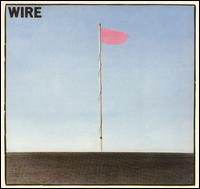 Wire:
Pink Flag (Nov. 1977), ****
Wire:
Pink Flag (Nov. 1977), ****
Pink Flag is one of the intersections of punk, pop, rock and art. That's right,
art. Paul Weller may have sung about art school, but Wire was formed
by art students. This is not punk music, and it would be tough to
call it post-punk (which is more of a historical term than a
descriptive one anyway) since it arrived alongside most punk music.
Wire was inspired by the Sex Pistols and the Ramones, but instead of
imitating or building on their work, Wire used the elements of punk
music for other ends. The band had recently dropped their lead
guitarist when they recorded Pink Flag, and had refocused
their sound accordingly. Thus, these tracks are designed and
constructed rather than written. Embracing minimalism, by not
replacing the departed guitar, the band usually introduce a rhythm
and then build on it, before quitting. Thick layers of distortion are
layered in the form of guitars. Their lyrics are frequently
incoherent and intentionally so, while their playing is precise and
glued to their rhythm. At points you might wonder if the guitars are
programmed - the band members may be robots designed by actual art
students combining a strange love of Kraftwerk and punk. This is not
a sloppy or obnoxious mess. They stop playing when or before their
ideas run their course. The key is that Wire had a sense of drama -
the measured buildups, the short stopping points of some tracks. All
of this leads to hit and run music, leaving the listener wondering
what they had just encountered.
Well,
what is it they encountered? Dark glimpses of man? Aural repression?
The horrors of war ("Reuters")? Whatever it is, it bubbles
and then evaporates, often within a couple of minutes. Yet, what it
is may not be important, as often they intentionally make their
lyrics unintelligible. This is art or theatre, and its impact may be
greater than the words in the message. When you can understand the
lyrics, frequently they consist of biting social commentary
("Reuters", the title track, "Field Day for the
Sundays"), but Wire has a sense of humor as well. The cleverly
titled "The Commercial" consists of 50 seconds worth of
instrumental music. Or the delightful nonsense lyrics of "Three
Girl Rhumba" ("a numbah's a numbah") providing
contrast to some of the darker material. Still, there are several
purely dramatic moments - the brief break in "Lowdown", the
odd shrieking sounds in the background of "Strange", or the
odd repeated phrase "How many dead or alive?" in the title
track or the grinding down on "Reuters".
Musically
these songs approach both the hard rock or the 60s oriented areas
becoming popular. For example, "Three Girl Rhumba" takes an
old fashioned chord pattern and then repeats it (similar to the
backing used by rap music?). There's almost a Velvet
Underground feeling sometimes in their approach to older rock
("Feeling Called Love"). There's some short, loud punk
tracks ("Mr. Suit", "Field Day for the Sundays",
"Surgeon's Girl") as well as excellent poppier ones (the
single "Mannequin" where their rhythm is infectious,
"Fragile") and a bunch of songs with excellent hooks that
lie somewhere in between ("Champs", "Ex-Lion Tamer",
"Three Girl Rhumba"). The downside to all the rapid-fire
running times (5 of the 21 tracks clock in at under 50 seconds) is
that by the time the twentieth track rolls around, you might feel you
have heard the chords before. (You probably have.) Also, some songs
may be an appropriate length for their ideas, but that does not mean
their ideas are particularly good ("Start To Move" is one
example). Still, Wire's overall approach is unique. I can completely
understand why some people would rate it higher, even if some of the
hit and runs do not make much of an impression.
The
band is Colin Newman (guitar, vocals), Bruce Gilbert (guitar), Robert
Gotobed (drums), Graham Lewis (bass). Produced by Mike Thorne.
 The
Modern Lovers (rec. 1972-3, rel. 1976), ****1/2
The
Modern Lovers (rec. 1972-3, rel. 1976), ****1/2 Never
Mind the Bollocks, Here's the Sex Pistols (Nov. 1977), ***
Never
Mind the Bollocks, Here's the Sex Pistols (Nov. 1977), *** The
Clash [US Version] (1977 [1979]), ****1/2
The
Clash [US Version] (1977 [1979]), ****1/2  Television,
Marquee Moon (Feb. 1977), *****
Television,
Marquee Moon (Feb. 1977), ***** The
Jam, In the City (May 1977), **1/2
The
Jam, In the City (May 1977), **1/2 The
Cars (Jun. 1978), ****
The
Cars (Jun. 1978), **** The
Buzzcocks: Singles Going Steady (rec. 1977-9, rel. 1979),
****1/2
The
Buzzcocks: Singles Going Steady (rec. 1977-9, rel. 1979),
****1/2 Pere
Ubu: The Modern Dance (Jan. 1978), ****
Pere
Ubu: The Modern Dance (Jan. 1978), **** Wire:
Pink Flag (Nov. 1977), ****
Wire:
Pink Flag (Nov. 1977), ****